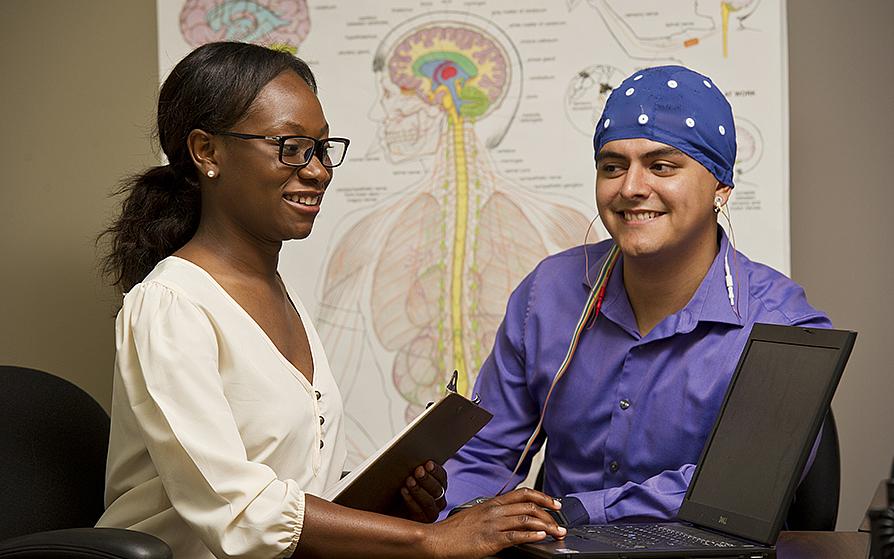School and Health Service Psychology Doctoral Program
The PhD in School and Health Service Psychology, formerly the School Psychology PhD program, at SFA is a program that offers primary training in school psychology and secondarily prepares students for child clinical practice. Its training approach integrates assessment and intervention strategies and the biopsychosocial model as the core unifying scientific themes in comprehending human behavior when working with children, youth, and families. The program emphasizes working with other professionals to accomplish scientifically backed interventions that effectively address academic, behavioral, family, and systemic issues. The SFA School and Health Service Psychology Doctoral Program was authorized by the Texas Higher Education Coordinating Board, or THECB in 2009, and the 99-hours post-baccalaureate PhD track was authorized by THECB in 2018. The PhD in School and Health Service Psychology is currently following the guidelines of the American Psychological Association, or APA, and will be seeking APA accreditation for academic year 2026.
Since 2009, the doctoral program has been dedicated to producing ethical, responsible and competent psychologists who employ scientific knowledge and critical and creative problem-solving methods. The mission of our program is to apply scientific knowledge and methods to the assessment and treatment of learning, behavior and psychosocial problems in general and special education populations in public and private schools as well as clinical practice. Our program emphasizes critical thinking, communication, personal responsibility, social responsibility, empirical and quantitative skills and teamwork. A cohort training model is based on an established course sequence, and most of our classes follow a face-to-face instructional modality in a physical classroom. Students are prepared to become licensed doctoral-level psychologists and school psychologists in Texas and beyond. Students in the program are often employed as school psychologists, educators, researchers, and/or practitioners in public schools and higher education, as well as licensed psychologists in community mental health facilities, hospital/medical settings and independent practice.
Licensure and Employment
Students in the PhD in School and Health Service Psychology program will be prepared to become licensed doctoral-level health service psychologists (LP) and school psychologist (LSSP) in Texas. Graduates may be employed as educators, researchers and/or practitioners in public schools and higher education as well as health service psychologists in community mental health facilities, hospital/medical settings and independent practice.
Tracks
There are two paths for student selection in admission to the doctoral program. The first path is the post-bachelor track, where students are required to take 99 semester hours, including the full-time academic year internship. Alternatively, a selected number of students qualify for the post-master’s track, which requires students to complete 72 semester hours, including the full-time academic year internship. Following the official full-time sequence, the recommended time for completion of the post-baccalaureate doctoral program for students is four years. Following the recommended full-time sequence, the recommended time for completion of the post-master's doctoral program for students is three years.
Eligibility for a Post-Bachelors Track (Standard Placement)
- Applicants with bachelor's degrees in areas related to psychology and education will be considered for admission under this track.
- Applicants with master's degrees in other disciplines may also apply to the post-baccalaureate PhD track.
Eligibility for a Post-Masters Track (Advanced Placement)
- To qualify for this track, students must:
- Hold a master's degree in school, clinical or counseling psychology from a regionally accredited institution.
- Grades of B or better on ALL graduate-level courses:
- Introduction to a health service psychology area (i.e. school, clinical or counseling psychology) - 3 credit hours
- Abnormal psychology or psychopathology - 3 credit hours
- Assessment - 6 credit hours
- Ethics - 3 credit hours
- Multiculture - 3 credit hours
- Intervention (e.g. therapy, counseling, ABA, etc.) - 6 credit hours
- Supervised practica/internship (at least 300 hours)
Graduate Assistantships
The doctoral program provides 16 assistantships for qualified graduate students. Stipends vary according to assignment and educational level of the applicant. Graduate assistantships in the School and Health Service Psychology doctoral program require assisting in research and/or teaching or assisting undergraduate courses. Graduate assistantships require 20 hours of work per week. A 20-hour assistantship carries a stipend of $21,225 for nine-month employment during the fall and spring semesters. To be considered for a graduate assistantship, applicants should indicate their interest in writing when accepted into the program.
Resources
How to Apply
You will need to submit:
- 3 letters of recommendation.
- A personal statement with the following prompt:
- "Please provide a narrative piece describing how your character and experiences have formed you into someone who will contribute positively and effectively to school and professional psychology. In this essay, please explain social, educational, cultural, and economic obstacles you have overcome in your journey to get to where you are today and your future objectives.”
- Curriculum vitae that describes degrees and previous experiences in the field of psychology and education.
Residency
Each student must enroll as a full-time student, taking at least nine credit hours each fall and spring semester, and six credit hours during the summer. All courses are conducted face-to-face and require the instructor and students to be present in the same room for lectures and practices. During fall and spring semesters, these face-to-face classes are typically scheduled on Mondays to accommodate students commuting from nearby areas. Summer courses may be offered fully online, via Livestream, or in hybrid formats.
Program Contact:
Email: PHDSPSY@sfasu.edu
Office: 936.468.2906
 Axe ’Em, Jacks!
Axe ’Em, Jacks!
